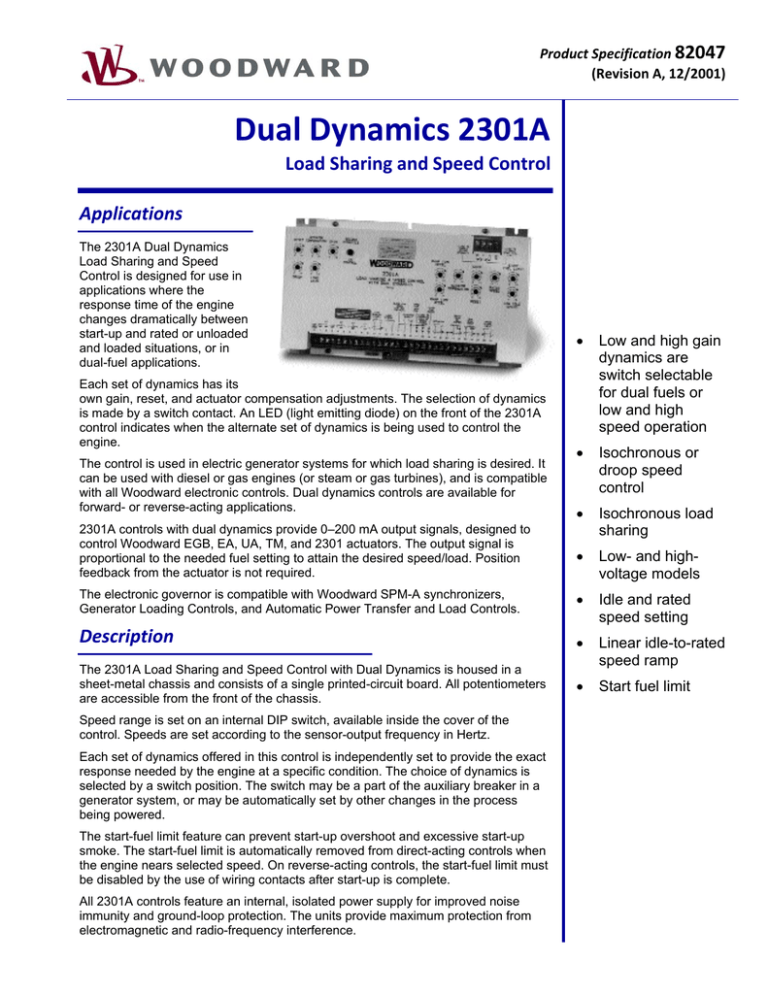
Product Specification 82047 (Revision A, 12/2001) Dual Dynamics 2301A Load Sharing and Speed Control Applications The 2301A Dual Dynamics
Load Sharing and Speed
Control is designed for use in
applications where the
response time of the engine
changes dramatically between
start-up and rated or unloaded
and loaded situations, or in
dual-fuel applications.
Each set of dynamics has its
own gain, reset, and actuator compensation adjustments. The selection of dynamics
is made by a switch contact. An LED (light emitting diode) on the front of the 2301A
control indicates when the alternate set of dynamics is being used to control the
engine.
The control is used in electric generator systems for which load sharing is desired. It
can be used with diesel or gas engines (or steam or gas turbines), and is compatible
with all Woodward electronic controls. Dual dynamics controls are available for
forward- or reverse-acting applications.
Low and high gain
dynamics are
switch selectable
for dual fuels or
low and high
speed operation
Isochronous or
droop speed
control
2301A controls with dual dynamics provide 0–200 mA output signals, designed to
control Woodward EGB, EA, UA, TM, and 2301 actuators. The output signal is
proportional to the needed fuel setting to attain the desired speed/load. Position
feedback from the actuator is not required.
Isochronous load
sharing
Low- and highvoltage models
The electronic governor is compatible with Woodward SPM-A synchronizers,
Generator Loading Controls, and Automatic Power Transfer and Load Controls.
Idle and rated
speed setting
Description
The 2301A Load Sharing and Speed Control with Dual Dynamics is housed in a
sheet-metal chassis and consists of a single printed-circuit board. All potentiometers
are accessible from the front of the chassis.
Linear idle-to-rated
speed ramp
Start fuel limit
Speed range is set on an internal DIP switch, available inside the cover of the
control. Speeds are set according to the sensor-output frequency in Hertz.
Each set of dynamics offered in this control is independently set to provide the exact
response needed by the engine at a specific condition. The choice of dynamics is
selected by a switch position. The switch may be a part of the auxiliary breaker in a
generator system, or may be automatically set by other changes in the process
being powered.
The start-fuel limit feature can prevent start-up overshoot and excessive start-up
smoke. The start-fuel limit is automatically removed from direct-acting controls when
the engine nears selected speed. On reverse-acting controls, the start-fuel limit must
be disabled by the use of wiring contacts after start-up is complete.
All 2301A controls feature an internal, isolated power supply for improved noise
immunity and ground-loop protection. The units provide maximum protection from
electromagnetic and radio-frequency interference.
Woodward 82047 p.2
Specifications Load Sensing, 3-Phase Potentials
Load Sensing, 3-Phase Currents
Speed Range
Speed Sensing
SPM-A Synchronizer (optional)
Speed Trim (optional)
Minimum Fuel (optional)
Droop (optional)
Failed Speed Signal Override
(optional)
Idle/Rated Ramp (optional)
Weight
90 to 240 Vac, 45 to 66 Hz, maximum load 3 VA per phase
3 to 7 A at full load, maximum load 1 VA
A switch selects one of the following speed ranges:
500 to 1500 Hz
1000 to 3000 Hz
2000 to 6000 Hz
4000 to 12 000 Hz
1 to 30 Vac, maximum load 1 k at 1 kHz
–5 to +5 Vdc for –3.3% to +3.3%
or –1.5 to +1.5 Vdc for –1% to 1% speed change
Maximum load is 100 k
0 to 10% speed decrease with 0 to 100 pot (1 W)
Opening an external contact in series with terminal 17 and the dc power to
the control will send a minimum-fuel signal to the actuator. The minimumfuel signal is an optional means for a normal shutdown.
The droop contact is wired in series with the auxiliary circuit breaker contact
and terminal 14, and the dc power to the control. Isochronous operation is
selected when both the droop contact and the auxiliary circuit breaker
contact are closed.
An external contact to override the failed speed protective circuit when
required for start-up
An external contact to accelerate from idle to rated speed when the contact
is closed
About 2.2 kg (4.9 lb), depending on model
Adjustments
Rated Speed
Idle Speed
Ramp Times
Start Fuel Limit
Gain, Reset, and Actuator
Compensation (both dynamics)
Load Gain
Droop
Sets engine speed over specified range
Sets engine idle speed at 30% to 100% of rated speed
0 to 22 s acceleration time from idle to rated speed
0 to 22 s deceleration time from rated to idle speed
25% to 100% of specified maximum actuator current. When used with
reverse-acting systems, the limit must be disabled after start-up is complete.
Sets dynamic response. Adjustable to accommodate diesel, gas, or turbine
engines. Totally different adjustments for each set of dynamics.
Provides calibration of the load on an individual generator when two or more
generators are paralleled
Provides 0 to 10% reduction in reference speed between no load and full
load
Control Characteristics
Steady State Speed Band
Load Sharing
Power Supply, High Voltage Model
Power Supply, Low Voltage Model
Operating Temperature
Storage Temperature
Maximum Ambient Humidity
Technical Manual
±0.25% of rated speed
Within ±5% of rated load with speed settings matched
90 to 150 Vdc or 88 to 132 Vac 50/60 Hz
20 to 40 Vdc
–40 to +85 °C (–40 to +185 °F)
–55 to +105 °C (–67 to +221 °F)
95% at 38 °C (100 °F)
82046
Woodward 82047 p.3
Outline Drawing of 2301A with Dual Dynamics
(Do not use for construction)
Woodward 82047 p.4
For more information contact:
PO Box 1519, Fort Collins CO, USA 80522-1519
1000 East Drake Road, Fort Collins CO 80525
Tel.: +1 (970) 482-5811 Fax: +1 (970) 498-3058
www.woodward.com
Distributors & Service
Woodward has an international network of distributors and service facilities.
For your nearest representative, call the Fort Collins plant or see the
Worldwide Directory on our website.
This document is distributed for informational purposes only. It is not to be construed as
creating or becoming part of any Woodward contractual or warranty obligation unless
expressly stated in a written sales contract.
Copyright © Woodward 1991–2001, All Rights Reserved


